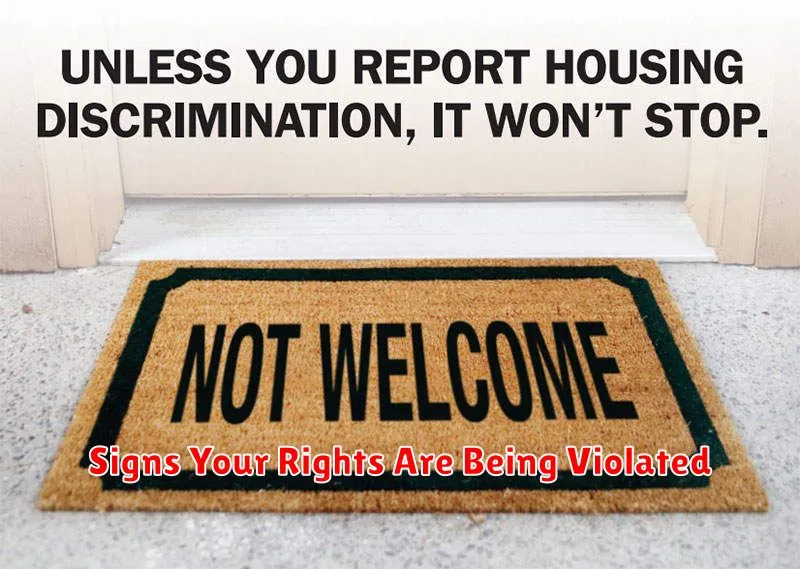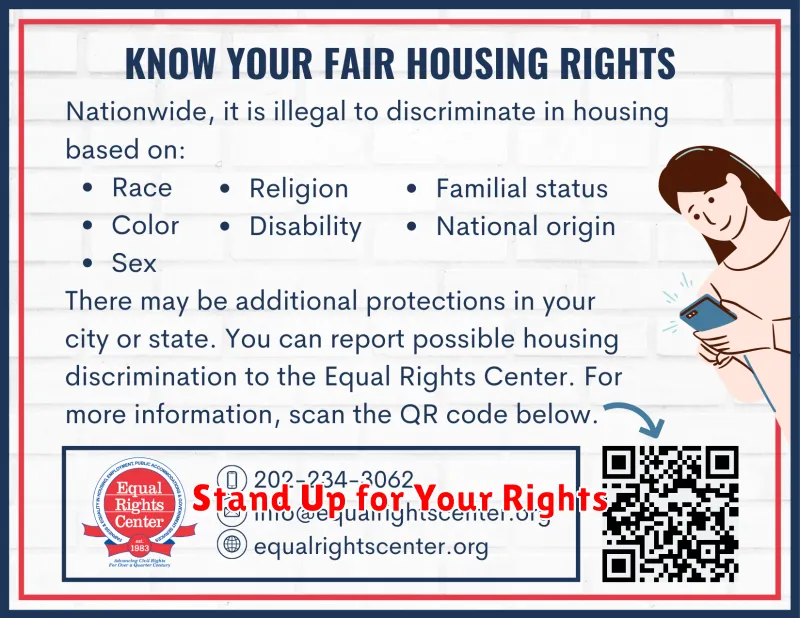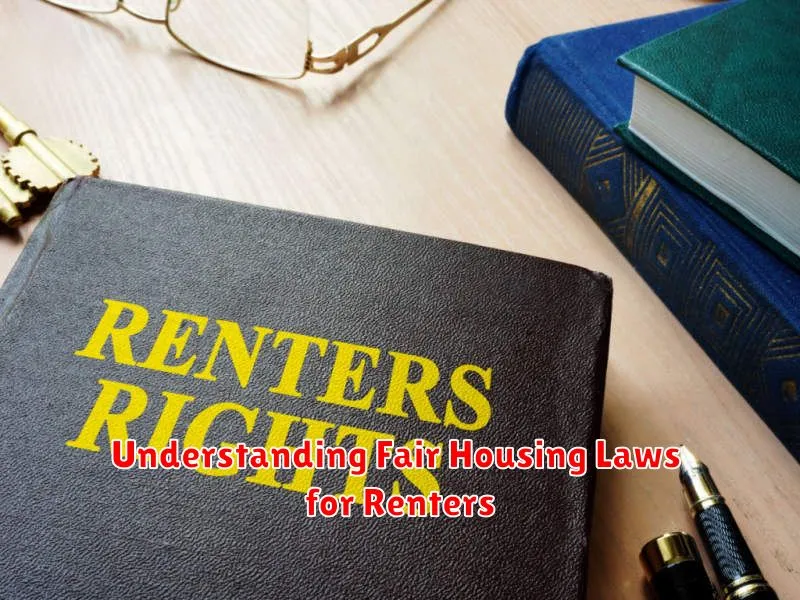Finding the perfect rental can be an exciting, yet sometimes challenging, process. One crucial aspect renters must consider is fair housing laws. These laws are designed to protect individuals from housing discrimination based on protected characteristics such as race, color, national origin, religion, sex, familial status, and disability. Understanding your rights as a renter under these laws is essential for securing safe and equitable housing. This article will provide a comprehensive overview of fair housing laws, focusing on key provisions and outlining the protections afforded to renters.
Navigating the rental market requires awareness of potential discriminatory practices and the avenues available for recourse should your rights be violated. From rental applications and lease agreements to property advertisements and tenant screening, it’s vital to be informed about what constitutes fair housing and unlawful discrimination. By understanding your rights and responsibilities, you can confidently secure housing free from prejudice and contribute to a more equitable and inclusive rental market. This guide will delve into specific examples of discriminatory practices and provide practical advice for advocating for your rights under fair housing laws.
What Are Fair Housing Laws?
Fair housing laws are a set of federal, state, and local regulations designed to prevent housing discrimination. These laws protect individuals from unfair treatment based on certain protected characteristics when they are renting, buying, or securing financing for housing.
The Fair Housing Act, passed in 1968, is the foundation of these protections. It prohibits discrimination based on race, color, national origin, religion, sex, familial status, and disability. Some state and local laws offer broader protection, adding characteristics such as sexual orientation, gender identity, marital status, or source of income.
These laws aim to create a fair and equitable housing market where everyone has equal access to housing opportunities, regardless of their background or personal characteristics.
Protected Classes Under the Law
Fair housing laws protect individuals from discrimination based on their membership in certain protected classes. Understanding these classes is crucial for renters to recognize potential violations of their rights.
Federal fair housing laws recognize seven protected classes:
- Race
- Color
- National Origin
- Religion
- Sex (including gender identity and sexual orientation)
- Familial Status (including the presence of children under 18)
- Disability (physical or mental)
Some state and local laws may offer additional protections beyond these federal classes. It is important to be aware of the specific laws in your jurisdiction.
Types of Rental Discrimination
Discrimination in housing is illegal under the Fair Housing Act. It occurs when a landlord or property manager treats someone differently based on their membership in a protected class.
Several protected characteristics are covered under this act. These include race, color, national origin, religion, sex (including gender identity and sexual orientation), familial status (presence of children), and disability.
Examples of discriminatory actions include refusing to rent to someone, charging different rents or security deposits, offering different amenities, or falsely claiming a unit is unavailable.
Signs Your Rights Are Being Violated

Under fair housing laws, renters have protected characteristics. Discrimination based on these characteristics is illegal. If you experience any of the following, your rights may be violated:
Refusal to Rent: A landlord refuses to rent to you based on your race, color, religion, national origin, familial status, disability, or sex.
Different Terms: You are offered different lease terms or rent amounts compared to other renters with similar qualifications.
Discriminatory Advertising: Rental ads use language that indicates a preference or limitation based on a protected characteristic.
Harassment: You experience offensive or unwelcome conduct related to a protected characteristic, creating a hostile housing environment.
Retaliation: A landlord takes negative action against you (like raising rent or starting eviction proceedings) because you complained about discrimination.
How to Report Violations
If you believe you’ve experienced housing discrimination, it’s crucial to report the incident. Documenting the violation is the first step. Keep records of all communication, including emails, letters, and notes from phone calls. Note the dates, times, and names of individuals involved.
You can file a complaint with the U.S. Department of Housing and Urban Development (HUD). Alternatively, you can file a complaint with your state or local fair housing agency. These agencies investigate claims of housing discrimination and can take action against violators.
When filing a complaint, be prepared to provide detailed information about the incident, including the type of discrimination you believe occurred, the name and address of the party you’re reporting, and any witnesses to the incident.
What Landlords Can and Cannot Ask
Understanding what questions a landlord can legally ask is crucial for a smooth renting process. Landlords are allowed to inquire about your rental history, income, and credit score to assess your ability to pay rent. They can also request references from previous landlords.
However, landlords cannot ask discriminatory questions based on protected characteristics. These include questions about your race, religion, national origin, familial status, disability, or sex/gender identity. Inquiries about your age or marital status are also prohibited.
Reasonable Accommodations and Modifications
Reasonable accommodations are changes to rules, policies, practices, or services that allow individuals with disabilities to have equal access to housing. These accommodations might include allowing a service animal despite a “no pets” policy or assigning a parking space closer to a unit for someone with mobility limitations.
Reasonable modifications are structural changes made to a dwelling or common areas to accommodate a person’s disability. Examples include installing grab bars in a bathroom or widening doorways for wheelchair access. It is generally the renter’s responsibility to pay for these modifications, but they may be able to take them with them when they move out.
Landlords must approve reasonable accommodations and modifications if they are necessary for the person with a disability to have full use and enjoyment of their housing, unless doing so would impose an undue burden or fundamentally alter the nature of the property.
Resources for Tenants
Knowing your rights and where to find assistance is crucial. Below are some key resources for tenants experiencing housing discrimination.
Government Agencies
The Department of Housing and Urban Development (HUD) is the primary federal agency responsible for enforcing fair housing laws. They investigate complaints of discrimination and provide resources for tenants. State and local government agencies also often have fair housing offices that can offer assistance.
Non-profit Organizations
Many non-profit organizations specialize in fair housing issues. They can offer legal aid, counseling, and advocacy services.
Understanding Local Differences
While federal fair housing laws provide a foundational framework, it’s crucial to understand that local jurisdictions often have their own specific regulations. These local laws can offer greater protections for renters than federal law. For example, some cities may include additional protected classes such as source of income or sexual orientation.
Therefore, it is essential to research the specific fair housing laws in your area. Contact your local housing authority or fair housing organization for information regarding local ordinances.
Stand Up for Your Rights

If you believe your fair housing rights have been violated, it’s crucial to take action. Document everything thoroughly. This includes dates, times, specific incidents, and the names of individuals involved. Keep copies of any related communications, such as emails or letters.
You have several options for recourse. You can file a complaint with the U.S. Department of Housing and Urban Development (HUD). Alternatively, you may choose to pursue legal action through a private attorney. Consult with a fair housing organization or legal professional to determine the best course of action for your situation.
Remember, you have the right to fair housing opportunities, free from discrimination. Don’t hesitate to assert your rights and seek assistance if you encounter unfair treatment.

